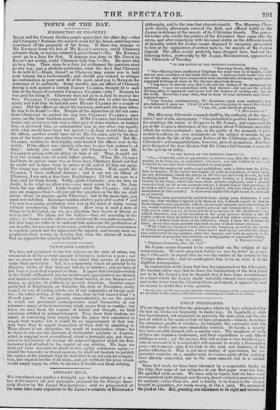LITERARY HOAX.
WE introduced our readers a fortnight ago to the substance of a no- tice of DUMONT'S life and principles, prepared for the Foreign Quar- terly Review by Sir JAMES MACKINTOSH; and we propounded at the same time some objections to Sir JAIlINS'S estimate of BmsrroAm's philosophy, and to the tone that characterized it. The Morning Chro- n2ele shortly afterwards entered the field, and offered battle- to Sir JAMES in defence of the morals of its Utilitarian friends. The power- ful writer who wields the politics of the Examiner then came into arena, and after remarking with his usual ability on the different kinilv of morality which Sir JAMES seems disposed to recognize, proceeded to hint at the application of certain tests to the morals of Sir JAMES himself. The affiiir would probably have dropped here, had not the following letter, professedly by Sir JAMES MACKINTOSH, appeared in the Chronicle of Tuesday.
" TO THE EDITOR OF THE MORNING CHRONICLE.
" Downing Street, 8th Dec. 1829.
" SIR—Having been confined at Clapham for some time by ill health, I did. not see your numbers of last week till to-day. I find you have made very free use of my name, and have commented with considerable acrimony upon some supposed writings of mine in The Foreign Quarterly Review.
"I beg leave to inform you, that I am not the author of the paragraph in question. I have no connection with that Review—did not see the article till long after it appeared—and never had the honour of writing one line in the work. However, I may state, that in most of your strictures and obser- vations I agree.
"Your Sunday contemporary, The Examiner, upon your authority, has also fathered it upon me. 1 trust it will do me the justice to insert this denial in its next publication. " lam, Sir, your obedient servant, "J. MACKINTOsil." The Morning Chronicle excused itself by the authority of the Spec- tator,* and of one, anonymous, "who pretended to positive knowledge," for ascribing the notice of D mom' to Sir JAMES, and expressed its joy at Sir JAMES'S disclaimer of the opinion about Utilitarian morality which the notice contained ; nay, in the gaiety of the moment, it. pro- ceeded to enforce its own sentiments on the subject of morals, by an episode from the life of the great Father of the Utilitarian school. The Chronicle's self-congratulations, however, proved premature. Another post dissipated the dear illusion that Sir JAMES had become a convert to the system of utility.
"TO THE EDITOR OF THE MORNING CHRONICLE.
" take the earliest opportunity to inform you, that the letter pur- porting to be from me, in yesterday's (7hr(mide, was not written by me, and is known to me only from having read it in your paper.
"What the motive for writing and publishing such a letter may be, I for- bear to inquire. If the writer had hoped, by such an expedient, to draw from me any declaration about the article in The Foreign Quarterly Review, he will be disappointed. The privilege of anonymous writing is a branch of the Liberty of the Press, which has been often usefully employed; and I should conceive that (as far as one example can go) I should impair that privilege, if at such a call I were to avow or disavow a writinr,° of a sort which is usually anonymous in this country. A disavowal implies the right to ask it, as much as an avowal.
"Having been prevented by accident from seeing your strictures, I can only say, that whether I agreed with them or not, I should expect to find in them remarks and arguments, which, on general subjects very interesting to me, would command from me a careful perusal and consideration. I agree with you in what you say in your article of yesterday of Mr. Bentham's un- sullied character, and of the devotion of his great powers during a life of eighty years to what he believes to be the good of his fellow creatures; and, like you, I believe that those of his followers, whom I have the honour to know, are as free from merited reproach as any of their fellow citizens.
"With whatever freedom I may discuss the tendency, as well as the truth of ethical and political opinions, I trust that I shall never consider the adop- tion and avowal of any opinion, after due inquiry, and with an anxiety to be independent of prejudice and interest, as being matter of reasonable blame.
" 1 am, Sir, yours, .1. MACKINToSII." "Clapham Common, Dec. 10, 1829."
Sir JAMES seems disposed to be coquettish on the subject of his compositions. We were prepared, before we saw his letter in yesi er- day's Chronicle, to repeat that he was the author of the article in the Foreign Quarterly ; and we could prove him to be so, were it of the slightest consequence.
In explanation of the hoax that has been practised on the Chronicle, the learned editor says that he knew the handwriting of the first letter not to be Sir JAMES'S, but he thought that it bore some resemblance to a hand which Sir JAMES might naturally enough have employed; and as the letter bore the Charing Cross post-mark, it appears he saw no reason to doubt that it was genuine.
*By the way, we (lid not observe that the Chronick recognized the companionship ■.£ the t■p,utator in this matter, until there was somethiug lil:e blame to be shared.


















 Previous page
Previous page